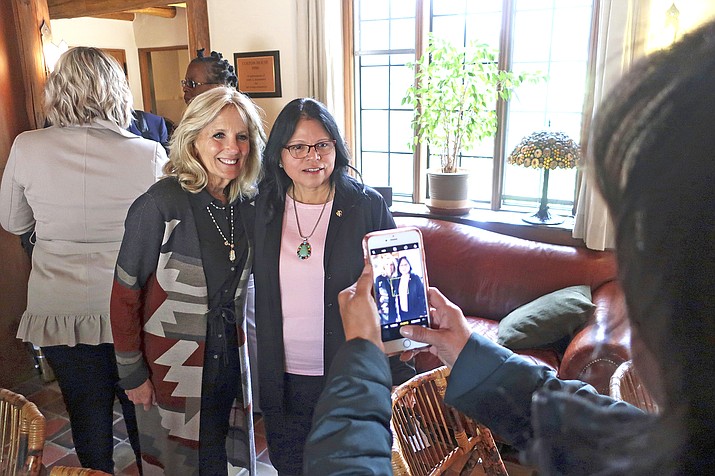Jill Biden to visit Navajo Nation, once floored by COVID-19
Jill Biden, left, and Tuba City Regional Health Care Corp. CEO Lynette Bonar pose for photos after an event in Flagstaff, Arizona. Biden is traveling to the country's largest Native American reservation, the Navajo Nation, which was hit hard by the coronavirus but is outpacing the U.S. in vaccination rates while maintaining strict pandemic restrictions. The trip, scheduled for April 22-23, 2021, will be Biden's third to the reservation that spans 27,000 square miles in the Four Corners region, and her inaugural visit as first lady. (AP Photo/Felicia Fonseca, File)
FLAGSTAFF, Ariz. (AP) — Jill Biden is traveling to the country's largest Native American reservation, the Navajo Nation, which was hit hard by the coronavirus but is outpacing the U.S. in vaccination rates while maintaining strict pandemic restrictions.
The trip, April 22-23, will be Biden's third to the reservation that spans 27,000 square miles in the Four Corners region, and her inaugural visit as first lady.
She's expected to meet Navajo officials in the tribal capital of Window Rock, named for an opening in a red sandstone arch and where the tribe established a veterans memorial. She'll also visit a boarding school and a nearby hospital that has been administering vaccines, both of which the tribe runs under contract with the federal government.
The trip comes as the Navajo Nation marked 10 consecutive days with no known COVID deaths and far fewer daily cases than early on in the pandemic, when the reservation had one of the country's highest per-capita infection rates. The tribe on April 21 reported one more death, bringing the tally to 1,263.
The tribe has approached reopening more cautiously than surrounding states, most recently because of coronavirus variants identified among infections. On April 26, it plans to reopen tribal parks to residents and increase capacity for businesses, gatherings and tribal casinos to 50 percent.
About half the reservation's population is fully vaccinated, roughly twice the U.S. rate. Still, residents on the Navajo Nation must wear masks and travel only for essential activity. Tribal roads are closed to visitors.
"We're not celebrating yet," Navajo Nation President Jonathan Nez said during a virtual town hall April 21. "The pandemic is still here."
Biden likely will hear stories of resilience and success in the face of great adversity, of financial struggles in trying to keep businesses and the tribal government afloat, and the obstacles in ensuring schools can deliver education remotely in a region where internet service can be spotty at best.
The Navajo Tribal Utility Authority has chipped away at the water, electricity and broadband needs, partly with funding from the federal Coronavirus Aid, Relief and Economic Security Act. But it estimates the price tag for providing basic utilities to residents at more than $5 billion. That won't be met even with money from the latest federal relief package, which set aside $20 billion for tribal governments.
Separately, President Joe Biden has proposed increasing the budget of the chronically underfunded Indian Health Service by $2.2 billion. The agency provides primary care to more than 2 million Native Americans. It has said the funding would help address longstanding inequities among its patients.
"It's a priority to improve relationships between the federal government and Native American people, but also there's a lot of need throughout the Navajo Nation," said Dr. Gregory Jarrin, a clinical consultant for the agency.
Jill Biden last went to the Navajo Nation in 2019 to celebrate the opening of a cancer treatment center in Tuba City, on the western side of the reservation. She urged Americans to contribute financially to address health disparities in a region where poverty and unemployment are high.
In 2013, she gave the commencement address at Navajo Technical University in Crownpoint, New Mexico, where she focused her speech on community, saying: "You all have a stake in each other's future."
That value is what drove tribes across the country to enact strict measures to prevent the spread of the coronavirus to protect elders and future generations.
The first lady kicked off a three-day visit to the U.S. Southwest with a tour of a vaccination clinic in New Mexico, where early efforts to get people registered for shots helped propel the state's standing as a national leader in vaccine distribution.
SUBMIT FEEDBACK
Click Below to:




